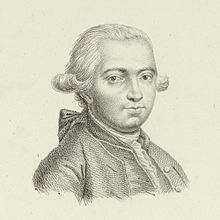
Felice de Giardini (12 April 1716 – 8 June 1796) was an Italian composer and violinist.
Early life
Felice Giardini was born in Turin. When it became clear that he was a child prodigy, his father sent him to Milan. There he studied singing, harpsichord and violin, but it was on the latter that he became a famous virtuoso. By the age of 12, he was already playing in theatre orchestras. In a famous incident about this time, Giardini, who was serving as assistant concertmaster (i.e., leader of the orchestra) during an opera, played a solo passage for violin which the composer Niccolò Jommelli had written. He decided to show off his skills and improvised several bravura variations that Jommelli had not written. Although the audience applauded loudly, Jommelli, who happened to be there, was not pleased and suddenly stood up and slapped the young man in the face. Giardini, years later, remarked: "It was the most instructive lesson I ever received from a great artist."
In London
During the 1750s, Giardini toured Europe as a violinist, scoring successes in Paris, Berlin, and especially in England, where he eventually settled. For many years, he served as the orchestra leader and director of the Italian Opera in London and gave solo concerts under the auspices of J. C. Bach with whom he was a close friend. He directed the orchestra at the London Pantheon. From the mid-1750s to the end of the 1760s, he was widely regarded as the greatest musical performing artist before the English public. His identity with the "Signor Giardini", who in 1774 sought with Dr Charles Burney to form a public music school associated with the Foundling Hospital, is uncertain. In 1784, he returned to Naples to run a theatre but encountered financial setbacks. In 1793, he returned to England to try his luck. But times had changed, and he was no longer remembered. He then went to Russia, but again had little luck, dying in Moscow in 1796.
Compositions
Giardini was a prolific composer, writing for virtually every genre which then existed. His two main areas, however, were opera and chamber music. Virtually all of his music is out of print with the exception of a few songs and works of chamber music. As a string player, he knew how to make string instruments sound their best. His chamber music combines the so-called Style Galant with the mid-18th-century classicism of J.C. Bach, the Stamitzes and the Mannheim school. In the Style Galant, the writing emphasises the soloistic qualities of the instruments, rather than integrated part-writing, to create a whole. Giardini, although he did write string quartets and quartets for other instruments – a new and evolving form at the time – concentrated on writing trios, primarily those for violin, viola and cello, of which he wrote at least 18.
Giardini is known among Christian churches for his tune "Italian Hymn", "Trinity", or "Moscow", which often accompanies the text to the hymn "Come, Thou Almighty King" and also John Marriott's hymn "Thou whose almighty word". It is the tune for "Glory to God on High", which is in the Latter-day Saint hymnal.
Family
Giardini married Maria Caterina Violante Vistris, a minor Italian singer, in August 1753 in Bramham. Both parties listed their residence at the time as Bramham Park, near Leeds. Bramham was a seat of George Fox-Lane, later created Baron Bingley, whose wife Harriet was Giardini's most consistent patron.
References
- McVeigh, Simon (July–October 1983). "Felice Giardini: A Violinist in Late Eighteenth-Century London". Music & Letters. 64 (3/4). Oxford University Press: 162–172. doi:10.1093/ml/64.3-4.162. ISSN 0027-4224. JSTOR 735572.
- Oxford DNB.
- It may be found in these hymnals and many others (hymnary.org lists more than 200 instances of it): Celebrating Grace, hymn number 2, 2010 Celebrating Grace, Inc., Macon, GA; Baptist Hymnal, hymn number 247, 1991 Convention Press, Nashville, TN; The United Methodist Hymnal, hymn number 61, 1989 The United Methodist Publishing House, Nashville, TN; The Celebration Hymnal, hymn number 8, 1997 Word/Integrity, Nashville, TN/Mobile, AL; Hymnal 1982, hymn number 365, 1982 The Church Hymnal Corporation, New York, NY; Worship (4th ed.), hymn number 549, 2011 GIA Publications, Chicago, IL.
- "Glory to God on High (hymn 67)". ChurchofJesusChrist.org. The Church of Jesus Christ of Latter-day Saints. Retrieved 16 April 2019.
Lyrics by James Allen (1734–1804)
- "Glory to God on High". SingPraises.net. Retrieved 16 April 2019.
- Borthwick Institute PR BRAM 1; Borthwick Institute Marriage Bonds MB G 1753
- DNB : Felice Giardini.
- The New Grove Dictionary of Music & Musicians, Ed. Stanley Sadie, London: Macmillan 1980. ISBN 0-333-23111-2.
- Some of the information on this page appears on the website of Edition Silvertrust but permission has been granted to copy, distribute and/or modify this document under the terms of the GNU Free Documentation License.
External links
- Free scores by Felice Giardini at the International Music Score Library Project (IMSLP)
- Free scores by Felice Giardini in the Choral Public Domain Library (ChoralWiki)
- Free scores at the Mutopia Project
- Felice Giardini (Person page at www.hymnary.org, counting hundreds of hymnals containing his compositions, mostly "Italian Hymn")
- 1716 births
- 1796 deaths
- Italian emigrants to the Kingdom of Great Britain
- Italian British musicians
- Italian male violinists
- English people of Italian descent
- Musicians from the Kingdom of Sardinia
- Italian opera composers
- Italian male opera composers
- 18th-century Italian composers
- 18th-century Italian male musicians
- 18th-century Italian violinists